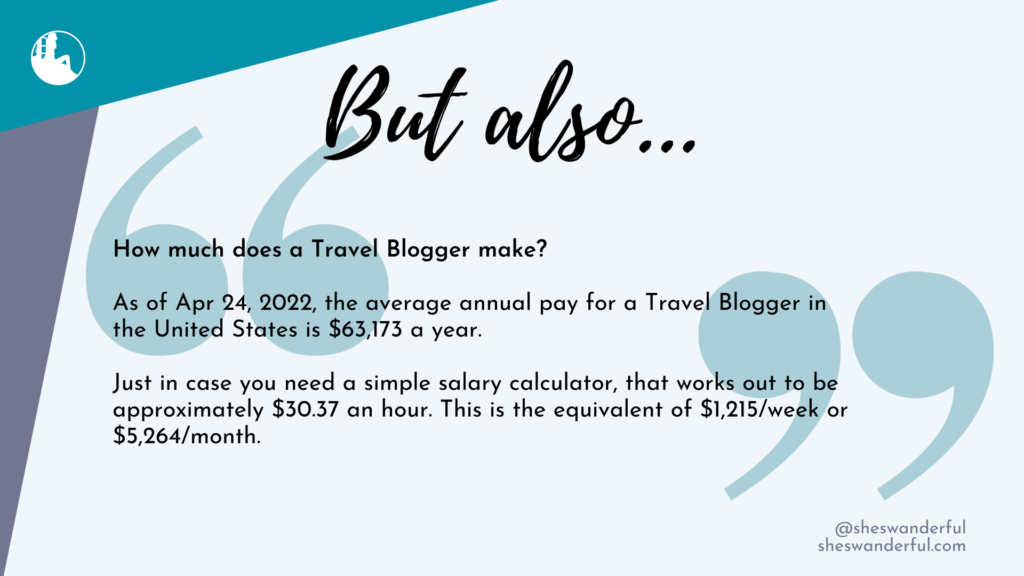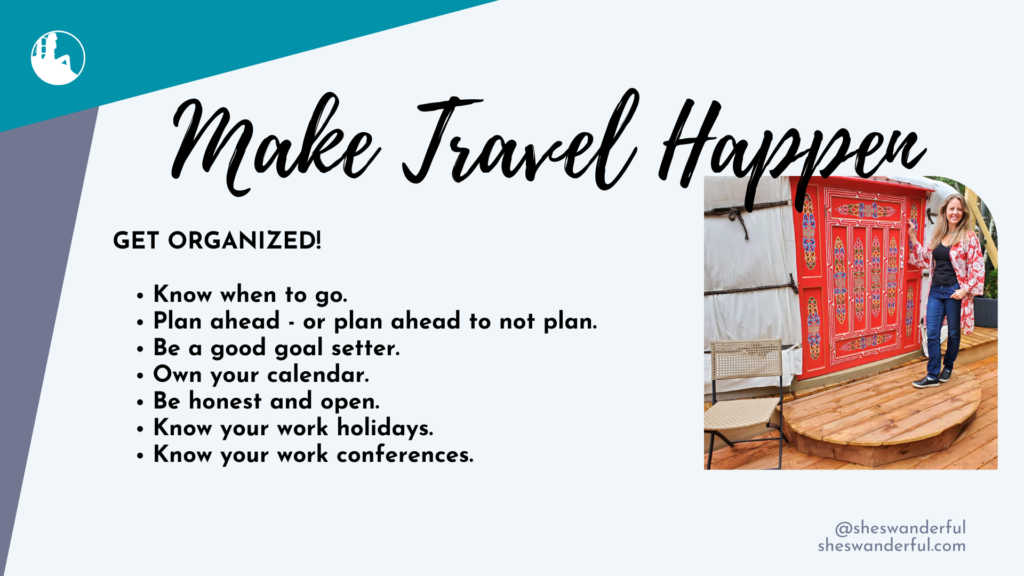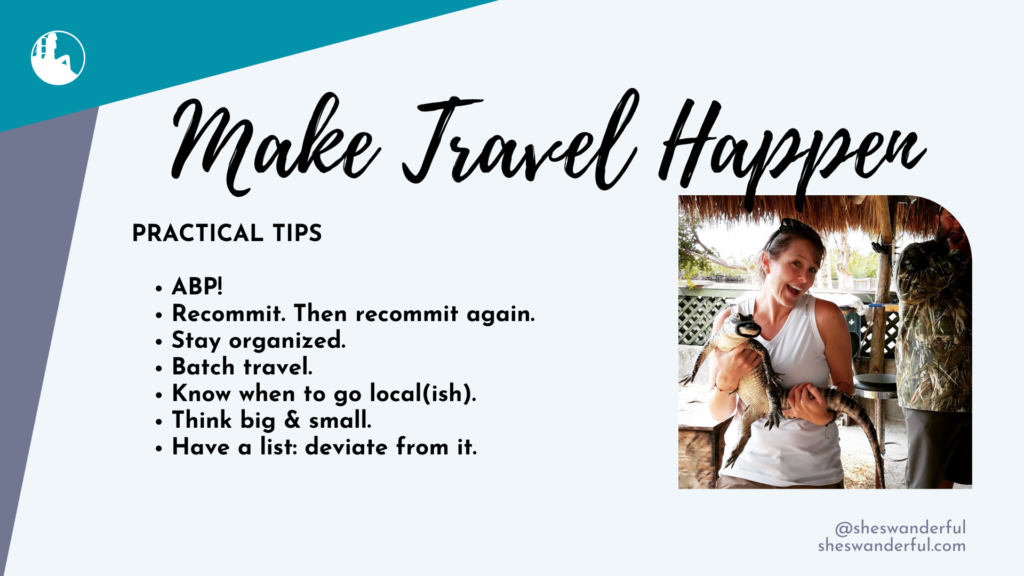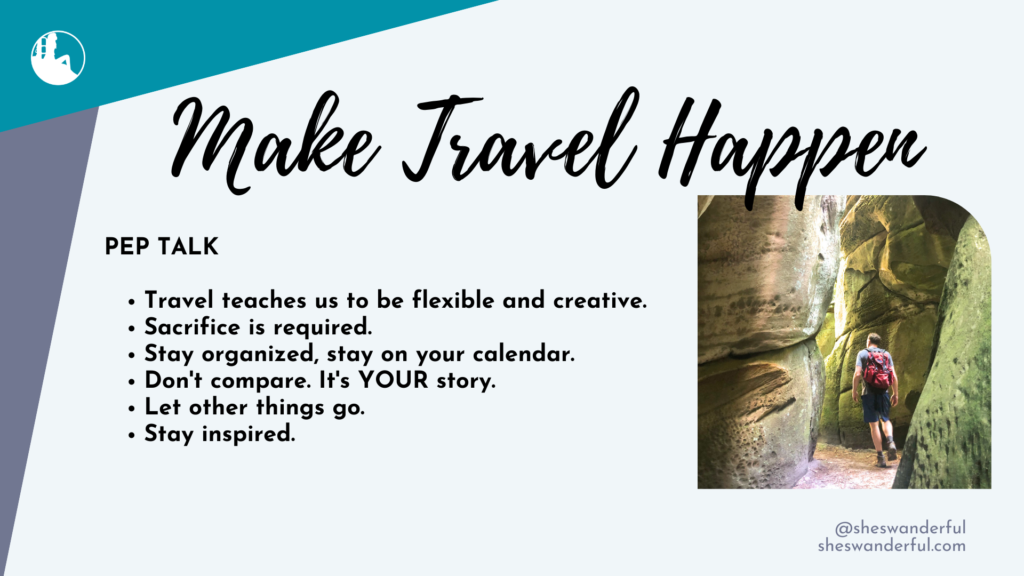
It’s hard to balance an extreme love of travel with a strong sense of responsibility or, even, just a desire for some stability. I feel it. I especially feel the struggle to balance these two conflicting feelings as a parent.
We’ve elected not to be digital nomads because we like offering our kids evening basketball with friends in the cul de sac and piano lessons and biweekly dinners with their young cousins. We’ve traded some things in for some other things in the shopping cart of life.
Ultimately, we’ve decided to hold down full-time jobs while trying to squeeze as much travel into the margins as possible. Of course, everyone has a different barometer on what constitutes enough or too much travel, but we’ve learned it really is possible to get travel in while still being committed to a career, home, and a more traditional lifestyle.
After all, that’s what our whole website is about!

Earlier this week, I gave an online presentation to the community of female travelers at Wanderful about this topic. But I wanted to share here, as well. This is a topic I am passionate about and love discussing.
Too many people give up or think it’s impossible. Too many people live in a self-constructed narrative of two weeks of vacation a year, the rest of the time at home because that’s just “what you do when you are responsible.” But life, particularly the job world, has cracked WAY open in the past 10 years or so, even moreso since COVID showed us all how remote and at-home work is possible.
So here’s my attempt to encourage you and persuade you to think bigger and differently. Bring creativity and make the life you want happen.
Here are my tips on how to get in travel while working full-time.

It helps to consider WHY you have a job at all.
State your why.
There are a slew of reasons to hold down a job of some sort and not opt for a digital nomad lifestyle. Speak your truth and say your why outloud. It helps.
Some reasons:
- money
- insurance
- benefits
- stability/lack of risk
- personal satisfaction
- you actually like your job
- family obligations
Keeping in mind why you are making the decisions you are will help you stay focused and steady when it comes to your story and path forward.

Don’t compare yourself to someone else’s story or social media feed.
Find inspiration, sure. But those who drop everything to travel have a different life than you – for reasons you’ve articulated (see above).
If it helps to see some numbers…
The price of travel is skyrocketing right now. Gas and ticket prices are way up as pent-up post-COVID demand unleashes with fury. Yet travel bloggers (and remember, these are bloggers who likely have been working very hard at this for years) make on average an annual salary of $63,000 a year. This doesn’t include benefits. That’s not going to go very far when it comes to international tickets!
Also, the influencer market is saturated and crowded, usually paid in-kind with goods and services, not hard cash.
Becoming an influencer or travel blogger isn’t outside the realm of possibility, but truly think through if it’s the right fit for you. Have a clear-eyed assessment as to what it takes to be successful and how long the ramp to paid blogging may be.

Next step is to set yourself up with the RIGHT JOB.
- Do I get paid leave? How much? Is sick leave different? Do I accrue time?
- Is this a customer service job or is there flexibility to be absent for periods of time?
- What is the company culture?
- Do I want the top rung career position, or am I OK sacrificing some salary and titles for a job with less responsibility, allowing me to travel? (This is a key question.)
- What are management’s expectations about being present and in the office?
- Do other people in the office travel? Does my manager travel?
Then, when you get the job, do it well. If you are an asset and if you excel, you will be setting yourself up for future asks (see below) and maximizing a flexible, traveling life.
Conversely, I do not believe in giving everything to a job. I believe jobs are meant to provide fulfillment, are our duty as contributing members of society, and are necessary fuel the life we want to live outside of a cubicle’s walls. Yet the job shouldn’t be the Thing in your life. I’ll mention boundaries below.
But when you do show up for work, when you are in a meeting, when a project is on your desk, do it well and bring your full self.

Then make the travel happen.
According to a study reported by Washington Post, 55% of Americans do not use all of their paid vacation time in a year. Of the time they took, U.S. workers used nine days to travel. More than half of Americans did not take a leisure trip of more than four nights over the past year, according to a report from Allianz Global Assistance.
This will not be you!
Understand your work environment and benefits.
Know your vacation, holiday, and sick days. Know what is required at your job to be successful. Understand what is a “no go” with your company and/or manager, and also know where YOUR boundaries are.
It helps to be aware of down times at work and what are particularly busy months or seasons. Don’t set yourself to go to Africa during a time a new product is being pushed out or a slew of events are planned. This is setting yourself up for working on vacation or at the very least creating additional stress.
Use your benefits and bundle holidays with weekdays to maximize days off.
Do you get days that rollover year-to-year? This can be a way to save up vacation days for a long trip in one year.
If there is a work holiday, use it! Add vacation days on either side to extend the trip with minimal time off.
Use weekends – even consider redeye trips – to maximize time travelling.

Ask for what you want.
Don’t be afraid to have a professional, reasonable conversation with your employer about what is or is not working for you. If you’ve been doing well at your job, you’ll have the opportunity to craft a new and creative path forward working with your employer.
- Ask for leave without pay if you can make it work financially for a time.
- Ask for more vacation time (instead of the raise).
- Ask for a flexible position or to work remote. (Yes, consider working during vacation! While you need to know your boundaries (see above) sometimes putting a few hours in every day on vacation can keep the amount of time you actually have to take off less.)
- Ask to attend a conference or work trip.
- Ask for part-time if you feel you can do that.
- Ask to put in more hours now for less hours later.
- Ask for a sabbatical.
Advocate for yourself and format a good argument and plan that benefits both you and your employer.
However, always be honest.
The worst thing you could do while setting yourself up to travel while also working is to lie, do things on the sly, or try to manipulate the system.
On an ethical level, be good and do good. Treat your employer how you would want to be treated.
On a practical level, given social media (and whatever tan or photos for your office desk you come back with), it is likely that your employer will know anyhow.

Bundle work trips or conferences with fun.
If you are headed out for a work conference or professional development experiences, add a vacation at the end and go explore either the city you are in or somewhere nearby. You’ve already done the travel, so go do your own adventuring.
Be organized!
This is crucial to success. Set good goals and recommit to them monthly in a formalized assessment (consider my beloved Powersheets to help). Plan your calendar and know when to go. Keep on top of your finances and your time off.
Even if you set aside an extended weekend to “do something spontaneous,” you still have to carve out that time at work and with your leave.
Own and control your calendar.
Don’t let it get carried away. Say no to things, block out days so nothing is scheduled, and don’t be afraid to skip a kid’s soccer game. Structure your time when you are working and at home to be productive. Don’t waste your time so that when you do leave, you can do so with more freedom and less mental load.

ABP = Always Be Planning.
I am always planning trips, even when I am just back or about to head out. I am always assessing the future to identify:
- How to maximize what we are able to see and do when we travel. Since we have to be efficient with our time when we go, it makes sense to plan ahead so we don’t miss opportunities.
- What good deals are out there.
- What makes sense to go see and do given the window of opportunity and time we have.
Also, constant planning helps me feel mentally fresh and free – knowing that my next trip is right around the corner and on its way helps me remember who I am and my purpose.
Know your goals and priorities.
Get a good awareness of where you want to spend your time, money, and energy. Then actually follow those. You’re not going to be able, likely, to spend all your vacation time and money on all the things.
Set your yearly priorities (again, Powersheets help!) and stay focused on what matters to you. Don’t start taking vacation days for things that aren’t travel.
Think both far and local.
Have your list, but be flexible! Know where you want to go both near and far. And really do think local as well. I promise there are a lot of awesome 2-3 hour road trips near you, and I don’t even need to know where you live. These road trips can make for great weekend adventures and satisfy the wanderlust.
Think creatively about where to go.
When considering trips farther away, know you’ll need more time off of work and “batch” your travel. If you are taking 10-days off, why not make it 14, if you can, and head to that other place nearby also on your list. Of course, if your plan is somewhere far flung and a 2-week itinerary, save up your vacation time and own your calendar.

You can make it happen: you can have the life of adventure you’ve always dreamed of and also stay committed to a career and full-time job.
Find websites and bloggers and social media accounts that inspire you (ahem ahem) and cull out the ones that invite you to critique and compare yourself.
Travel teaches us, ultimately, to be creative and flexible. When out on the road or in a foreign country, there is an absolute inability to predict everything. As travelers, we learn to think on our feet and to bring energy to problem-solving.
And that, my friend, is what you are doing balancing full-time professional work with travel. You are bringing energy and flexibility to live your life the way you want and in a way that works for you. You’re outside a playbook or expectations. And isn’t that a fun place to be?
